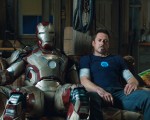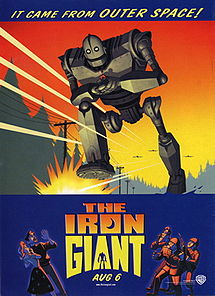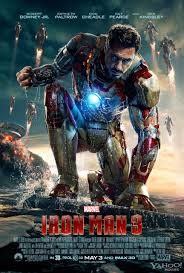Who stuck an adaptation of the 1999 cartoon The Iron Giant into the middle of Iron Man 3? Not that I’m complaining. Even The New Yorker loved it (as opposed to the formulaic explosions that bookend the movie). Robert Downey Jr.’s abrasive bromance with 11-year-old Ty Simpkins is the film’s brightest and most unexpected subplot. Though it also adds to the film’s overall incoherence. Which, again, might be a good thing. Not since Tim Burton was defining the superhero blockbuster in a single bound have we gotten such a (to use Tony’s term) “hot mess” of a movie.
Even before the young Mr. Simpkins’ entrance, Iron Man 3 was straining its thematic rivets. Aside from the obligatory bad guy machinations, the story scaffold looks like your standard marriage plot variety. Yes, Tony and Pepper are already together at the start, not married exactly, but at least, you know, whatever. Tony quickly overturns the domestic bliss by sending one of his remote control drones to romance his girl while he finishes some work in the lab (anyone notice that Shane Black and Drew Pearce lifted the scene from Watchmen?). Tony is literally phoning it in, and Pepper’s stuck with his empty shell.
Soon the robot drone is jumping into bed with them (yep, Watchmen again) and Pepper is packing. Next thing she’s climbing inside some other super-genius’s brain, and Tony’s pal warns him he’s going to lose her if he doesn’t change. Which he does. When things start exploding, he remote controls that robot suit to encase her instead of himself. It’s actually a bit poignant—especially when Iron Pepper returns the favor by shielding him a moment later.
The weird thing though? We’re only about thirty minutes in. Sure, there’s a reprise when Pepper saves him a second time at the climax, followed by the formal exploding of the Iron drones in evidence of Tony’s now focused devotion to Pepper. He even chucks his cyborg heart over a cliff in the epilogue.
But romance is not the machine driving this movie. In addition to becoming a less dickish boyfriend, Tony has to get over the PTSD brought on by his near-death in The Avengers. This is fairly new terrain for a superhero plot and is one of several ways the specter of Afghanistan haunts the movie. The platoon of regenerative thugs are all maimed soldiers who literally grow back lost limbs. Osama Bin Laden is played by the Mandarin—who is played by a Baptist minister—who is played by a washed-up British actor—who’s played by Ben Kingsley—who most of us remember best as Gandhi. Terrorism, it turns out, is not the problem. It’s the War on Terrorism. Which might explain why the President looks like George Bush and not Barack Obama—especially when he’s being rescued by Don Cheadle. So when Tony blows up his armada of Iron Drones, he’s also saying goodbye to a military policy a lot of Americans would like to see go too.
Except when exactly is it that Tony gets over all that pesky post-traumatic stuff? He’s been tinkering in his basement for months, so why does one Home Depot shopping spree turn him into a McGuiver-esque 007? And what does it mean that he promises Pepper he’ll catch her and then can only watch with us as she plummets to her (apparent) death? And if both the romance plot and the foreign policy allegory agree on vanquishing all that deadly hardware, why does the newly superpowered Pepper need an extra boost of tech to put the bad guy down a final time?
Maybe this is where Ty Simpkins and The Iron Giant come in.
If you’ve not seen the Brad Bird movie, I highly recommend it. My daughter adored it when she was four. A mal-functioning robot crashlands in smallville where a father-less boy hides it in his shed while he and a wacky father-figure partner work to repair it. Sound familiar? It gets better. Like the Iron Man suit, the Iron Giant divides into semi-autonomous pieces, and the story climaxes with the self-sacrificing hero sailing into the sky to prevent a U.S. nuclear warhead from destroying the town. Which, incidentally, is also the climax of The Avengers. The Iron Giant even pays homage to the ur-superhero, Superman, who the Giant emulates to escape his programming as a soulless military machine.
But if being a less dickish boyfriend means finding your inner father figure for a half-orphan, the film mocks the tropes more than it fulfills them. This isn’t Spielberg. It’s a Spielberg parody—a particularly hilarious one. Downey and Simpkins are a comic tag-team that skewer the feel-good formula they’re only half pretending to inhabit. It’s as if we’ve crashlanded in a different movie.
But soon Tony is driving back down the main plotline, his remote control suit soon to follow. And what is it exactly that he learned during the detour? Mock sincerity. Deadpan delivery. Comic timing. All the things we loved about Tony but that no longer worked with Pepper in the room. He had to drop his defenses or lose her. All his jokes were misfires on the home front. So the kid gave him a new comic target. Simpkins replaces Paltrow as sparring partner and straight man. Iron Man is above all else a comedian. Refueled with a live audience laugh track, he’s ready to smash the bad guys again.
This all makes sense for one reason only. Iron Man isn’t Tony Stark. He’s Robert Downey Jr. Yes, Black and Pearce wrote the script, and Paramount dropped some $200 million into the budget, but the film’s structural logic isn’t animated by CGI effects. The movie only works because it’s so damn funny.
Even the post-credit Avengers 2 teaser is pure sketch comedy—Tony and Doc Banner trading barbs in a two-minute therapist routine. The material is pretty hackneyed, but these guys make you want to laugh anyway. Political commentary, character arcs, plot structure—it all melts away when you’re laughing.
Comedy is Iron Man’s real superpower.



Excellent review, excellent writing!
I’m fascinated by how brazenly the flicks employ modern allegorical figures. Tony Stark IS the military-industrial complex. The Mandarin IS a media creation (quite literally– I won’t spoil the surprise, though.) The terrorist as media superstar.
Downey just bleeding rocks, as usual. He also fascinates me because I’ve never heard of such an incredible career comeback.
One moment he’s a coked-out hasbeen, reduced to a supporting role on TV’s ‘Ally McBeal’, from which he’s ignominously fired overnight.
And now he’s the only actor in Hollywood history to star in THREE billion-dollar franchises at once.
O Fortuna!
The Mandarin was a politically correct cop-out.
That’s all I can say without a spoiler alert.
I haven’t seen the film yet, but I do remember wanting to jump out of my seat and strangle Tony Stark when, in Iron Man 2, he said that he had single-handedly “privatized a nuclear deterrent” or something or other.
I just gnashed furiously on my popcorn instead.
Since everyone’s been telling me that it’s actually not as bad as the second film, I think it’s definitely on my “to-watch” list.
The Iron Man 3 plot doesn’t make a lick of sense, but I’m realizing that doesn’t actually matter to movie critics one bit!
It’s funny and Robert Downey is cute, some individual scenes are well crafted, the CGI is expensive, two thumbs up!
Mandarin was politically incorrect avant le letter when he was created.
It makes way more sense for The Mandarin to be a media creation, in this movie, than for to him to be anything else. Media is everywhere in the movie. Tony Stark’s one big mistake that leads to his downfall is misspeaking in an interview. And then letting the world know where he lives, leading to paparazzi newscoptors an unexplained attack by unknown actors. When Tony Stark needs a fast internet connection, he breaks into a news van and has to deal with a starstruck fan. There are nearly Tropic Thunder levels of self-referentiality in this movie.
The movie really is all over the place. When the Extremis super-soldiers show up, interrupting the mock-heartwarming Iron Man bits, the movie suddenly turns into a monster-of-the-week TV show.
At least there’s a PC “you create your own demons” plot (the US creates its own enemies through its imperial policies abroad – the Mandarin mentions it, and in addition to the President looking like GW, the Vice President is the evil villain in the pocket of the military defense contractor). That at least puts in movie in the camp of incoherent liberal fantasies, with the Bourne movies, which is a nice change of pace from all the other incoherent conservative fantasies. Iron Man is a member of S.H.I.E.L.D. but just calling on those guys who protect us by being able to hack into all of our emails automatically makes the movie more fascist.
The movie doesn’t have logic, only emotional logic. Robert Downey Jr. is able to break into the Mandarin complex with only items bought at Home Depot (hilariously not triggering any FBI Watchlist alerts even though he’s wearing a school-shooter black hoodie during his domestic-terrorist shopping spree) because the suit isn’t Iron Man, “I am Iron Man.”
(Although to be fair, security at the Mandarin complex is pretty lax – closer to the level of security on a film set than the level at a military base.
My comment is about as coherent as the movie >__> Sorry about that.
Interesting how incoherent liberal fantasies can end up just as unpalatable and reactionary as their conservative counterparts. The Mandarin revelation (which I’ll try to be coy about, but damnit anyone reading the comments thread of a review of a movie they haven’t seen deserves what they get), while delightfully executed by Kingsley, and quite unexpected, has the ultimate effect of entirely negating the existence of the foreign victims of American imperialism. The War on Terror is just a creation of Industrial Light and Magic, Iraq and Afghanistan are probably filmed somewhere out in Nevada, and all of this just obfuscates what really matters, the romantic rivalries of white billionaires. That incredible scene where Pepper is talking to wosherface, the botanist, who is feeling guilty about weaponizing her inventions, really highlights this. Pepper comforts her, saying something to the effect of “It’s alright, we used to be arms dealers too.Don’t be too hard on yourself.” It’s a touching moment of two arms dealers forgiving each other. Hey, I wonder if that legless kid in Iraq forgives you too? But that’s all in the past. Tony’s changed, he’s a sustainable energy, TED talks billionaire now (well, except for selling the Iron Patriot to the military. But what are a few WMDs between friends?). Besides, that kid was probably cooked up in the Jim Henson Creature Factory anyway.Forget politics, what really matters is that you change your heart.
I’m posting way past this thread’s freshness date (by internet standards) but I just saw the film, so…
It’s interesting that the film gives (probably unintended) aid and comfort to Truthers. Oh well.
A liberal nugget: in Tennessee (where I grew up, and I appreciated the not-too-insulting representation of the state) a guy draws his gun on one of the baddies, but the baddie takes the gun from him. It’s my understanding that the majority of bad guys with guns get their guns by stealing them, directly or indirectly, from good guys with guns. IM3 presented this in a punchy little action haiku.
I’ve never seen Ben Kingsley do comedy before, unless you consider Sexy Beast a dark comedy. Hi-Larious. It seemed to me that his Mandarin voice was Walter Cronkite, The Voice Of Truth.